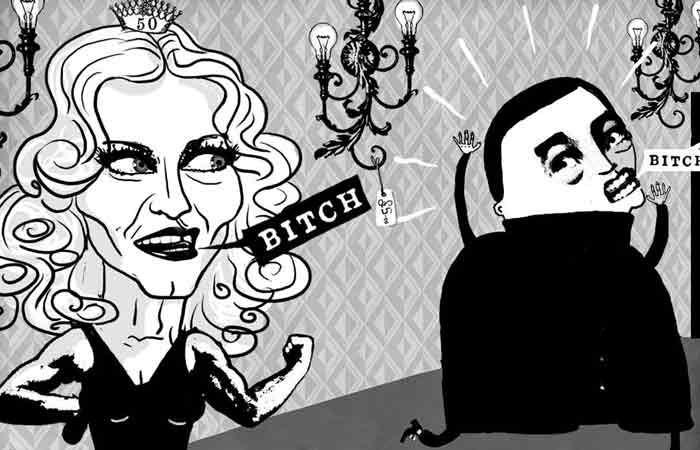John Walsh: Tales of the City
'What was the bone of contention that caused this apparent schism in the Ciccone family? A light fitting?'

Not since the heyday of the Borgias has there been such a problematic family as the Ciccones, if the recent revelations by Madonna's brother, Christopher, are anything to go by. As readers of a Sunday newspaper discovered at the weekend, Maddy and Chris are a long way from Maggie and Tom Tulliver in The Mill on the Floss when it comes to sibling amity. "I gave up my life to help make you the evil queen you are today," he seethes in an email. "I've made you what you are. You wouldn't be anything without me!" she sneers back, before calling him a thief, a liar, a traitor and "the most untrustworthy person I've ever met".
What was the bone of contention that caused this shocking family schism? The newspaper reports it was a light fitting that Christopher (a gay interior designer) had bought for his sister's new French chateau-style house on Sunset Boulevard. Madonna sent a flunkey to return it to the shop and discovered that her brother had added a mark-up to the bill. Not, you'd have thought, a detail to warrant starting a war, but these people are different from us. If history can celebrate the War of Jenkins' Ear, it can damn well be serious about the War of Madonna's Electrical Socket.
Even more interesting is the war reportedly conducted between Christopher and Mr Madonna, Guy Ritchie – a protracted spat, revolving around the homosexual quotient of both men, and their supposed appeal towards, or revulsion from, each other. Their first row is on the dance floor at Donatella Versace's party, when Ritchie threatens to bash up a teenage (presumably gay) associate of Christopher who is dancing with Madonna. Christopher pushes Guy off. Guy grabs his future brother-in-law and bounces him up and down (as you do). Christopher shoves him against the wall and grinds his hips against the film director's manly posterior... Guys! Guys!! Enough of the repressed sexual desire already! What is this, the wrestling scene in Women in Love?
At Skibo Castle for the big wedding, Christopher is shocked by Guy's contemptuous talk of "poofters", but intrigued by the groom's friends who speculate amusingly, "Wouldn't it be funny if Guy were gay?" He makes a rude remark about Guy's availability to all the boys later on – and soon discovers he's been given the smallest bedroom in the servants' quarters, and a seat at the reception dinner miles from the action, with its back to the bride and groom's table.
Mr Ciccone never actually declares out loud that Guy Ritchie is fighting to ignore his own internal poofter, but the sentiment can be found all over the text. As when he concludes, "Madonna and I argue over the slightest detail – [like] a doorknob... We've never argued over such details before, and I feel as if I'm falling into a strange, dark hole." I'll bet you do, Christopher. Extraordinary how much passion is generated in the Madonna family by knobs and sockets.
The joys of love, according to the song "Plaisirs d'Amour", last only a moment, while the sorrows last all your life. A melancholy sentiment, I've often thought, and one that doesn't accord with my own experience. But that's the thing about strong emotions, isn't it? There aren't any hard rules about how intensely we feel them, and how long we feel them for.
Until now, that is. I'm indebted to the grim, unsmiling men who run the Economic Journal for publishing some triumphant research into the effects of life-changing events on people over a period of 20 years. It seems that, however delighted we may be when we get married, we stop feeling that delight after five years. We become blasé about having children at around their second birthday. However blissful we may feel about promotion or a pay rise, it'll be assimilated by the boring actuary in our soul, and we'll soon be back feeling like disgruntled losers. To be fair, the scientists found that nasty things also get assimilated: divorce, bereavement, being sacked, having everyone in the UK read about your five-girl S&M romp in a cellar – they also get packed or pestled away into one smooth, flavourless pudding that you call your interior life.
Personally I don't believe a word of it and I suspect that one's experience of happiness is directly related to one's innate capacity for it, the eagerness with which one anticipates it and the fondness with which one reflects on it. But I'm intrigued to think that happiness should be considered a subject for serious analysis by science. Professor Sir Fred Hoyle, of The Black Cloud fame, spent the end of his career trying to establish how long athletes felt the elation of breaking a world record, before the feeling faded. Michael Frayn wrote a novel, A Landing on the Sun, which took the mick out of such endeavours; in his book, a civil servant tries to work out the exact (and only) moment in his life that he was truly happy.
Ever since the scientists in Swift's Lagado laboured to extract sunshine from cucumbers, people have tried to isolate elements of pleasure and to impose a bit of scientific cause and effect on what appear to be annoyingly random and chaotic spasms of feeling. Would it be terribly counter-Enlightenment to say I hope they never manage it?
Join our commenting forum
Join thought-provoking conversations, follow other Independent readers and see their replies
Comments
Bookmark popover
Removed from bookmarks